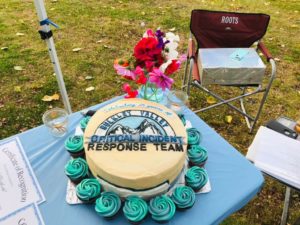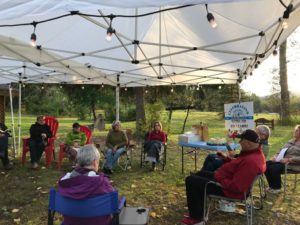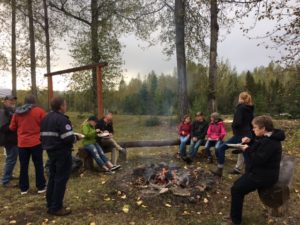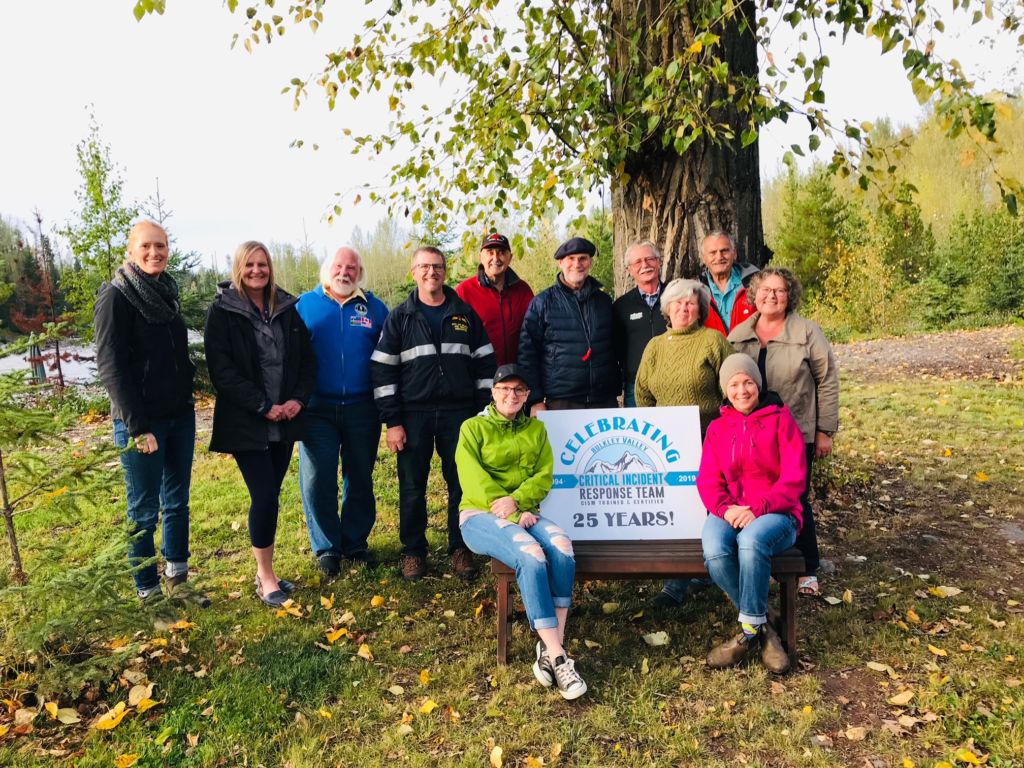By: Debora Chatfield, Program Coordinator
Bulkley Valley Critical Incident Response Team
 The Bulkley Valley Critical Incident Response Team (BVCIRT) has been operating for over 26 years in a small group of northern Canadian communities (Smithers, Telkwa, the Hazeltons, and Houston, BC). It was a grassroots initiative, created from necessity. A back-country helicopter crash involving a family of four and the helicopter pilot, required intense emergency service response from each of these communities. This well known, well loved, family of four, included two active children, a mental health professional and a teacher. They worked and played in these small connected communities. The largest of these was Smithers, with a population of about 5000.
The Bulkley Valley Critical Incident Response Team (BVCIRT) has been operating for over 26 years in a small group of northern Canadian communities (Smithers, Telkwa, the Hazeltons, and Houston, BC). It was a grassroots initiative, created from necessity. A back-country helicopter crash involving a family of four and the helicopter pilot, required intense emergency service response from each of these communities. This well known, well loved, family of four, included two active children, a mental health professional and a teacher. They worked and played in these small connected communities. The largest of these was Smithers, with a population of about 5000.
These family members were colleagues and sports enthusiasts connected to mental health professionals, schools, medical staff, sports clubs, and more. At that time, there were very few or no critical incident resources for volunteer fire departments, emergency health services, police, and emergency hospital staff, much less schools or businesses.
Professionals and lay people (mostly health and first responders) from a variety of agencies came together to explore critical incident response resources for their overwhelmed and grieving first responders, friends and colleagues. It was a spirit of caring and concern that birthed this program, and that exists to this day, to maintain a capacity to care for our own.
Perhaps you will remember Dr. Robert Scott (psychologist) and Captain Chip Theodore (retired firefighter) who came to New Hazelton more than 20 years ago to start the educational component for a local team. We remember them fondly!
 We have maintained a core group of volunteers and one part-time paid coordinator over these years to provide services to first responders, industry, business, and citizens involved in traumatic events. We have provided education, training and mentoring to new volunteers and continue to raise funds to host ICISF training in our communities.
We have maintained a core group of volunteers and one part-time paid coordinator over these years to provide services to first responders, industry, business, and citizens involved in traumatic events. We have provided education, training and mentoring to new volunteers and continue to raise funds to host ICISF training in our communities.
Bruce Ramsay, ICISF trainer, has been a special trainer/mentor over the years and acts as volunteer and clinical supervisor still to this day. Although many who are involved in these ICISF trainings may never become volunteers for BVCIRT, they carry their knowledge and expertise into their professional and personal lives. This education is never wasted. It leads to an improved capacity for small northern communities to care for the people who live and work here. They share their new knowledge as friends and neighbors, first responders, business owners and those in mining of forest industries.
BVCIRT volunteers provide interventions to first on scene at an MVA fatality or sudden death at work or in schools. We have traveled to remote mine sites where there has been a workplace fatality and attended to businesses, municipalities, emergency special services, police, fire, hospitals, emergency health services and hospital staff. We have responded to avalanche victims, railroad and highway fatalities and sexual assault files. We acknowledge that this is just one more tool, that crisis intervention is not everyone’s need, that it might be one- on- one interventions or a referral to counselling that is most helpful.
 I am proud that, although often struggling to find donations, we continue to find ways to operate with volunteers who have experienced the benefits of this process. Having participated in a bereavement intervention or critical incident response debriefing and, having found value in participating, took training to become members on the team. An advisory of experienced facilitators mentor new team members and evaluate each experience.
I am proud that, although often struggling to find donations, we continue to find ways to operate with volunteers who have experienced the benefits of this process. Having participated in a bereavement intervention or critical incident response debriefing and, having found value in participating, took training to become members on the team. An advisory of experienced facilitators mentor new team members and evaluate each experience.
Presently we have trained volunteers from a variety of disciplines including Police, Fire, Victim Services, Emergency and Mental Health services, School counselors and private counselors, Provincial Liaisons, Forestry, Search and Rescue, Hospice, Provincial Mobile Response, mining safety and hospital. We have also grown critical incident response capacity so that Forestry and Search and Rescue now have their own ICISF trained peers and teams to work especially in those fields. Many years ago, the local Hospice Society, led by Dr. Christine Piercy, adapted the Mitchell model to provide Bereavement Interventions for tragic and unexpected death. These are typically provided to groups affected by the loss of a colleague, student, or associated group. Some of the original members still exist on the team. There is a shared value of contributing to our community, building the capacity for our community first responders to be well, to do well, to continue to serve in very difficult situations. There is a sense of trust and caring, and a dogged pursual to support our friends and neighbours in difficult times.
Most of our team have been moved to join because they participated in a debrief or guided conversation and found the process to be helpful, perhaps even life changing. As an RCMP based Victim Support Unit Manager for over 16 years, I was trained, and participated in debriefings and used the Critical Incident Stress and Psychological First Aid processes to help first on scene at motor vehicle accidents, next of kin notifications, grizzly attacks, robberies, assaults and more. It gave me important tools to maintain a sense of calm and to encourage referrals to counselling resources when needed. The CIS process was a gift that allowed me to work in a very traumatic environment and helped to preserve a sense of personal equilibrium, resilience, gratitude and even joy. I am grateful to those in my community and Police Based Victim Services of BC (Carolyn Sinclair) who saw the value in the training and encouraged it. I still hear encouraging words from past participants who felt solace and comfort in the interventions that volunteers and professionals have provided.
From a hospice worker:
“I’m a new recruit to the world of CISM, but have found it to be such a helpful tool in the work I have already been involved within our local hospice society. I am accustomed to working with people who are grieving and have often felt the frustration of not being able to help earlier on in their grief journey. CISM fills that gap; responding quickly to an incident can be invaluable in the healthy processing. I’m grateful to be a part of this wonderful team.”
Each of us brings a unique perspective to the team and connects to a different demographic in our work, play, athletic or spiritual lives and yet we are connected by the common bond of caring.
